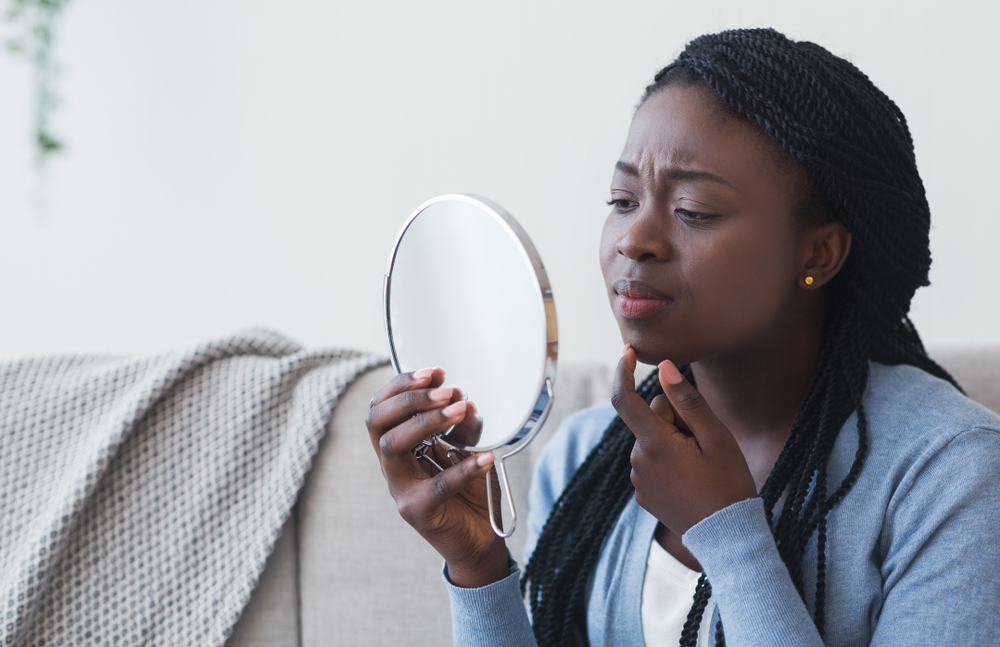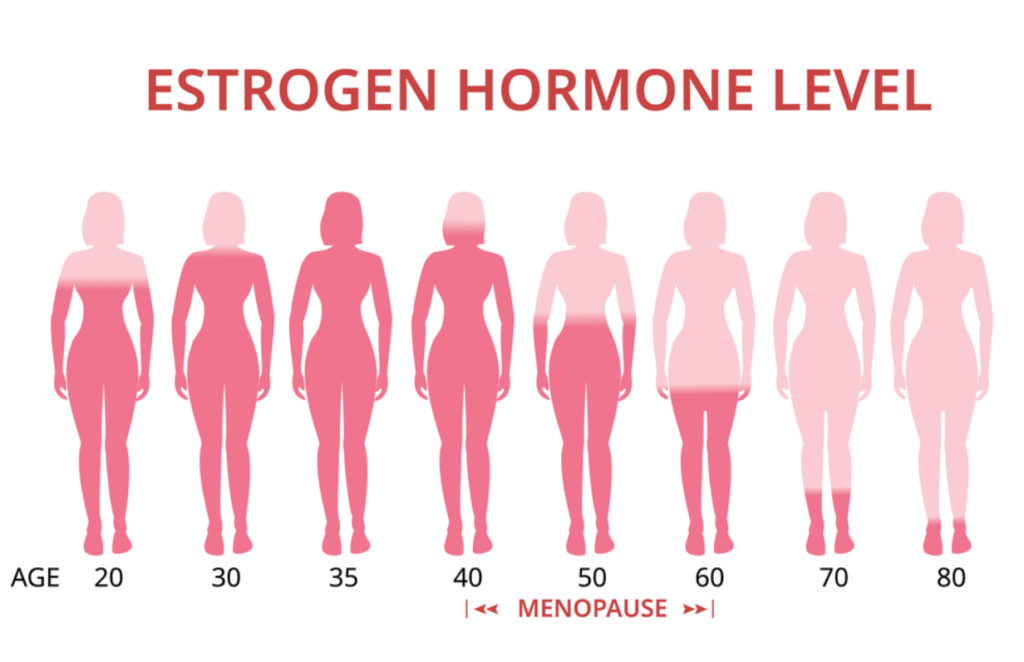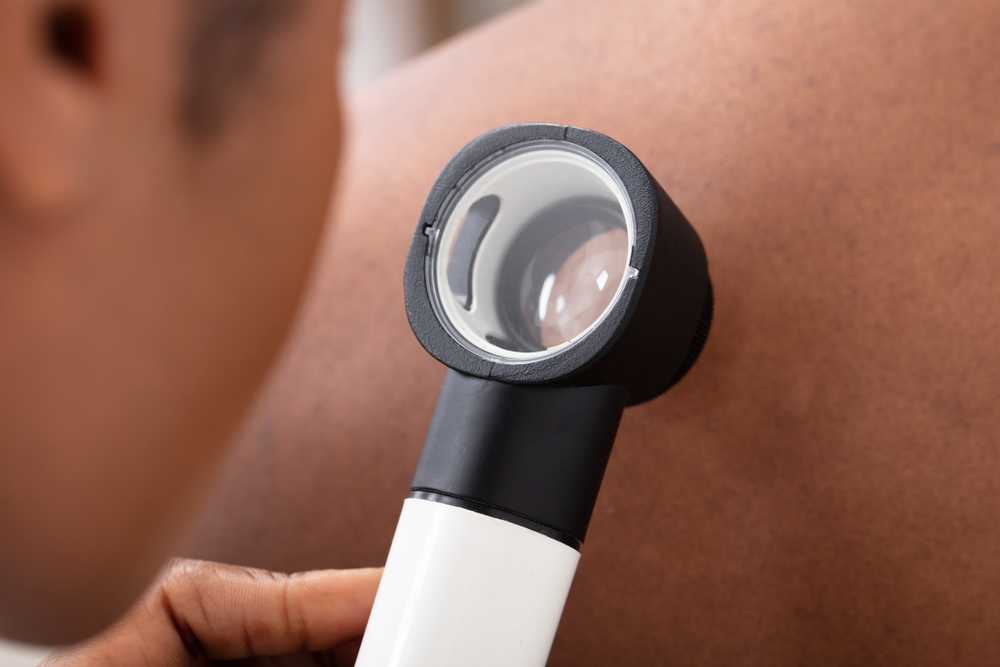Menopause is one event that all women experience in their lifetime. It is that period in life when a woman’s menstrual cycle comes to a complete stop. Nevertheless, it helps to remember that menopause is not an abrupt event. This means that a woman doesn’t suddenly stop having her period. There are a series of symptoms and changes that lead up to the onset of menopause. Sometimes, these symptoms may even include perimenopausal acne.
As we mentioned earlier, these changes are usually accompanied by a plethora of symptoms such as hot flashes, mood swings, breast tenderness, and breakouts in form of acne. In addition, this article contains 10 menopause symptoms that are unknown.

The period leading to menopause (when your body starts transitioning into menopause) is referred to as perimenopause. Perimenopause is accompanied by a major change in hormone levels which may cause acne in adult women.
This post gives an insight into perimenopausal acne, what causes it and how to manage it when it occurs. Have a good read!
Causes of Perimenopausal Acne
Whether as an adolescent or as a woman transitioning into menopause, the predominant cause of acne breakouts is changing hormonal levels. During perimenopause, hormone levels are constantly changing and fluctuating. These changes may have their own effects on the skin.
Here’s how it works: Your skin’s tone and texture largely depend on the hormone levels in your body. As a result, the hormonal fluctuations that come with menopause and in the past, adolescence, may cause acne and skin breakouts.
As hormone levels start to decrease during menopause, there is less collagen in the skin, so the skin becomes thinner and drier. Likewise, a reduction in estrogen level equals less oil production, which also leads to drier and thinner skin. Another effect of menopause is a rise in testosterone level which can trigger higher oil production and make the skin pores more clogged. Clogged skin pores result in acne breakouts.
All these hormonal changes result in compromised and hypersensitive skin that may be more prone to acne.
There are other factors that can trigger acne breakouts in perimenopausal women. Some of these include:
- Genetics
- Stress
- Dietary changes
- Lack of sleep and exercise
Treatment of Perimenopausal Acne
Acne breakouts in menopause don’t usually warrant any medical treatment. The acne usually disappears once your hormones balance out.

However, if you are concerned about your acne, there are tips, over-the-counter treatments, as well as prescription treatments that can help you clear it up.
You should be mindful of the kind of products you’ll put on your skin when treating your acne. Remember, your skin is in a more sensitive state than it has ever been. Watch out for products designed to treat adolescent acne and might be potentially harsh for your own skin.
There is no specific cure for acne, but there are proven treatment options which can help clear it up.
Some of These Acne Treatments Include:
1. Hormone Replacement Therapy (HRT)
This treatment approach focuses on correcting the hormonal imbalance that causes acne. It is the most effective method of treating acne during menopause.
HRT can relieve many discomforting symptoms of menopause but there are certain risks associated with using hormonal therapy. Hormonal replacement therapy can present a serious risk for women with a history of breast or endometrial cancer.
You should speak with your healthcare practitioner about the options available for your acne treatment and the risks associated with them.
2. Oral medications
To treat perimenopausal acne, your doctor may prescribe drugs which are known as androgen blockers. Androgen blockers are drugs which help to balance out excess androgen production. Spironolactone is a commonly prescribed androgen blocker in the control of hormonal acne.

Also, some antibiotics like Benzamycin can be used in the control of acne. However, doctors don’t usually encourage long term use of antibiotics in the treatment of acne because bacteria can develop resistance to the drug.
3. Topical medications
These are drugs that you apply on the skin to relieve the symptoms of acne.
Topical treatments that contain retinoids, benzoyl peroxide, salicylic acid, niacinamide, azelaic acid and vitamin C are very effective when managing perimenopausal acne.
Home Treatments For Perimenopausal Acne
If you don’t want to see a doctor about your acne, there are ways to manage your breakouts at home. Maintaining a good skin care regime is key when trying to manage acne prone skin.
You will find the following tips helpful in keeping a good skin care routine:
- Wash your face daily with a cleanser containing salicylic acid. Salicylic acid is great for unclogging pores.
- Incorporate sunscreen into your skin care routine. Ingredients like salicylic acid and retinoids increase your skin’s sensitivity to UV rays from the sun. Sunscreen gives your skin the protection it needs.
- As much as it is tempting to pop or pick at your pimples, don’t! picking at your pimples may cause scarring or even make the condition worse.
- Replace oil-based cosmetic products with water or mineral-based products.
- Always wash off makeup before going to bed
Most times, these tips work best if your acne is mild. On the other hand, if you have severe acne, it may be necessary to see a doctor and discuss stronger treatment options.

In addition, lifestyle and dietary changes may also help in your acne treatment. Here are some lifestyle tips that are effective in managing acne:
- Lower your stress levels
- Limit alcohol and caffeine intake
- Eat a healthy and balanced diet
- Get enough sleep
- Avoid smoking
- Always wash your face with gentle soap
- Choose the right products to use on your face
Conclusion
Acne is a normal and common experience for women. If you’re experiencing acne, don’t worry, you’re not alone.
Hormonal imbalance is the major culprit behind acne in most women. Eventually, when hormones balance out, the acne usually disappears.
If you’re concerned about your acne, there are many effective ways to manage the condition. Speak to your doctor about the treatment options that will be effective in managing your acne.

